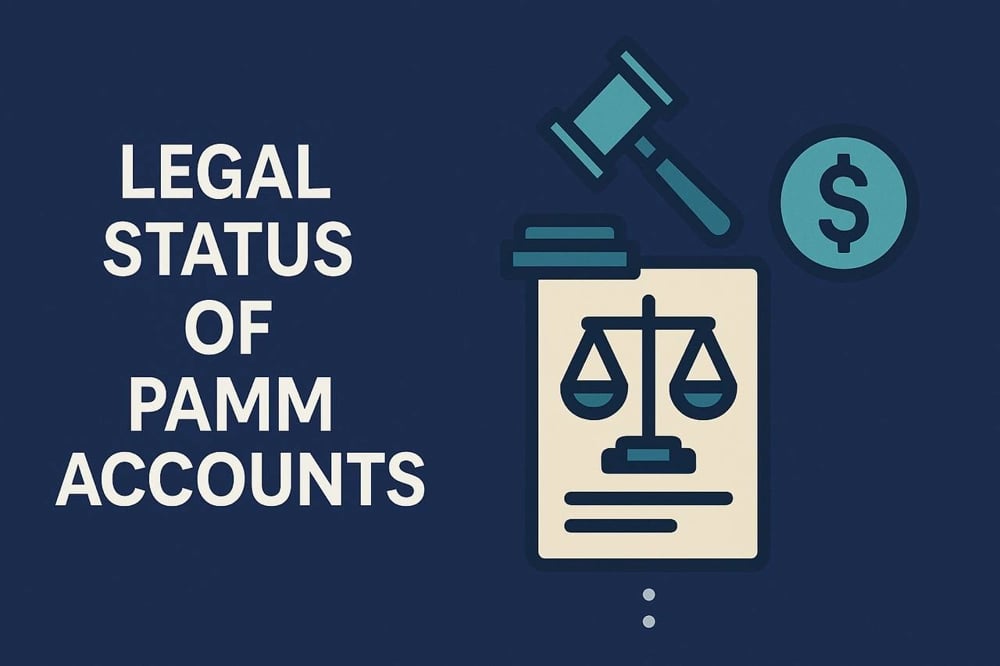Legal Status of PAMM Accounts by Jurisdiction
PAMM (Percentage Allocation Management Module) accounts are a widely used form of managed investment in the trading world. However, despite their growing popularity, their legal status varies significantly by jurisdiction. Understanding these differences is crucial for investors looking to minimize legal risk while participating in PAMM-based investments.
What is the Legal Nature of PAMM Accounts?
Legally, a PAMM account is not a standalone financial instrument. It is better described as a mechanism for pooled fund allocation, where the trader manages multiple investors' capital without transferring ownership of the funds.
This makes PAMM accounts fall under various classifications depending on the regulatory framework of a country, including:
Asset management contracts
Collective investment schemes
Investment advisory services
For a better understanding of the model itself, refer to our foundational article: What is PAMM in trading.
European Union and the UK
In the EU and UK, PAMM accounts are often regulated under MiFID II and FCA guidelines, respectively. This means:
Brokers must be licensed financial service providers.
Fund managers (PAMM traders) must operate through regulated platforms.
Investor funds must be segregated and reported transparently.
Failing to meet these standards can result in severe penalties and loss of investor protection schemes such as FSCS (Financial Services Compensation Scheme) in the UK.
United States
In the U.S., PAMM accounts are typically subject to CFTC and NFA oversight. However, most foreign PAMM providers refuse U.S. clients due to the high regulatory burden.
If a PAMM service is offered in the U.S., it must comply with:
Commodity Pool Operator (CPO) registration
Detailed disclosures and fund performance reporting
Strict anti-fraud compliance
Most U.S.-based investors are therefore excluded from participating in offshore PAMM services. For insights into how this impacts investor safety, see Are PAMM Accounts Safe?.
Asia: Japan, Singapore, and China
Japan strictly regulates all investment structures under the FSA (Financial Services Agency). Any PAMM structure offered without licensing is considered illegal.
Singapore allows PAMM-style investments via brokers licensed under MAS (Monetary Authority of Singapore).
China has no official recognition of PAMM accounts, and many offshore platforms are blocked by national firewalls. Investors face serious legal ambiguity here.
CIS Countries and Offshore Jurisdictions
In CIS countries like Russia, Ukraine, and Kazakhstan, PAMM accounts operate in a legal gray area. Local brokers may self-regulate through internal policies and public agreements.
Many offshore jurisdictions, such as St. Vincent and the Grenadines, Belize, and Marshall Islands, host PAMM brokers due to lax regulation. While these reduce entry barriers for brokers, they also offer little to no protection for investors.
To assess such risks properly, refer to What Are the Risks of a PAMM Account?.
The Legal Grey Zone: When Is It a Scam?
A lack of regulation does not automatically mean a scam — but it greatly increases the potential for fraud, mismanagement, or fund misappropriation.
Common red flags include:
No license or registration in any jurisdiction
Lack of transparency about fund performance
Guaranteed returns (which violate investment compliance in most countries)
We cover this in detail in Are PAMM Accounts Safe?.
How to Verify the Legality of a PAMM Provider
Before investing:
Check if the broker is licensed in a recognized financial jurisdiction.
Ask for legal documentation: terms of service, investor agreements, and fund allocation policies.
Make sure there is real-time reporting and proof of segregation of funds.
Be cautious of platforms not openly disclosing who manages your money.
If these are missing, your capital is at risk — both legally and financially.
Frequently Asked Legal Questions
What are PAMM accounts?PAMM accounts are fund allocation systems where investors’ money is pooled and managed by a trader based on percentage allocations. A full explanation is available in our article What is a PAMM account?.
What legal risks do PAMM investors face?The main risks include loss of funds due to unregulated brokers, lack of dispute mechanisms, and inability to enforce contracts in offshore jurisdictions. We explain this in What Are the Risks of a PAMM Account?.
Are PAMM accounts safe from a legal perspective?Only if operated through a licensed and transparent broker. For a full risk assessment, see our guide Are PAMM Accounts Safe?.
Is a PAMM account legal everywhere?No. In some regions, like the USA or Japan, offering PAMM services without proper registration can be illegal. For regulatory safety, choose platforms operating under proper jurisdictional oversight.
Can PAMM accounts be both legal and profitable?Yes — provided the PAMM account is operated by a regulated broker and managed by an experienced trader. Legal compliance ensures investor protection, while profitability depends on trader skill and strategy. To learn more, read Profit Potential of a PAMM Account.









Comments
This transaction highlights how strategic investments are reshaping automation's role in global tech
Investments of this scale reflect a strong belief in automation’s scalability and resilience